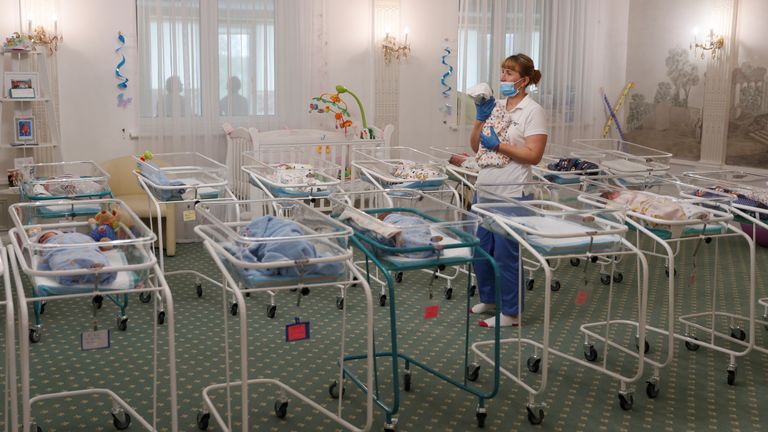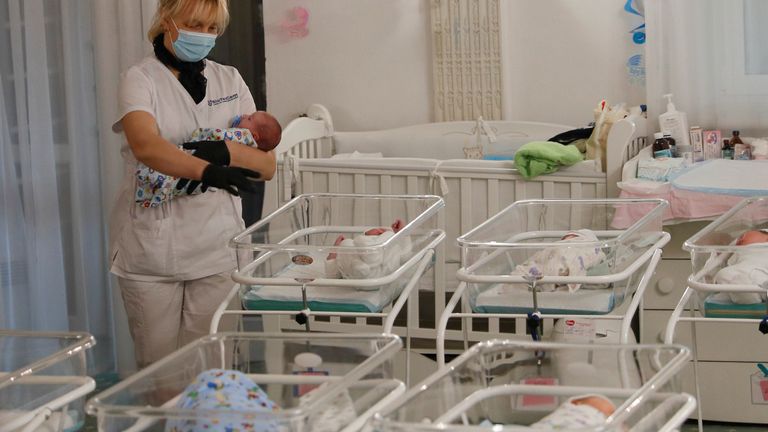
Dozens of babies are stranded in Ukraine because of the coronavirus pandemic.
Lying in rows of cots in a small hotel on the outskirts of Kiev, 51 babies born to surrogate mothers are stranded in Ukraine as the coronavirus lockdown is preventing parents from the United States, Europe and elsewhere from collecting them.
The babies were born to surrogate mothers in Ukraine and are due to be collected by parents from the US, UK, Europe and elsewhere.
But Ukraine, like many countries around the world, has closed its borders to foreigners in an effort to limit the spread of the coronavirus, which has killed more than 300,000 people globally.
Ukraine's borders have been closed to foreigners since March, leaving most of the parents to make do with seeing their babies in pictures and during video calls.
The 51 babies lying in rows of cots in a small hotel on the outskirts of Kiev are likely to be waiting for a long time yet, as Ukraine's government said it can only allow parents into the country if a request is received from the relevant embassy.
For others, leaving the country is the problem.
Rafa Aires, from Spain, got in before the lockdown to collect his daughter Marta but now he cannot leave, as almost all flights have been suspended and he needs to finish the paperwork.

Ukraine imposed a ban on foreigners entering in March, and most parents have only seen their newborns through pictures and video calls with the clinic.
Rafa Aires from Spain managed to get in before the lockdown. He was united with his daughter Marta but cannot leave as Kiev has suspended almost all flights and he needs to finish the paperwork.
It means a stressful wait for his wife Maria, who was unable to travel with him due to work.
“Every day I make video calls with my wife for one hour or an hour and a half for her to see the baby,” he said. “It is very difficult.”
“Nurses and medical personnel in this hotel are wonderful. They make my life easier,” he said.
The government says it can only permit parents to enter Ukraine if it receives a request from the relevant embassy.
The Hotel Venice belongs to the clinic BioTexCom, which released video footage of the babies to raise public awareness and spur the government into acting more quickly.
Reaction from the authorities was swift.
Lyudmyla Denisova, the human rights ombudsman for the Ukrainian parliament, said the video showed the country had a “massive and systemic” surrogacy industry where babies were advertised as a “high quality product”.
She suggested looking into changing the law to allow only Ukrainian parents to use such services.
“We were prepared for this negative reaction,” the clinic’s founder Albert Tochilovsky said. “Given that parents need to be quarantined for 14 days, I want to speed up the process.”
Denisova ordered checks on the clinic but said she found that BioTexCom was following all procedures correctly. Surrogacy is legal in Ukraine.
The Hotel Venice is surrounded by a high fence with barbed wire. The building is usually where parents stay while picking up their babies. At BioTexCom, a surrogate mother receives about $15,000-$17,000.
Parents arrive from all over the world including the United States, China, Britain, Sweden and Ireland. The parents of sixteen of the babies have been able to travel to Ukraine so far.
“The children are all provided with food, a sufficient number of employees look after them, but there is no substitute for parental care,” said Denis Herman, BioTexCom’s lawyer.
“We try to send photos of children to the parents, we try to make conference calls, but this cannot replace communication in direct contact,” he said.
No comments:
Post a Comment